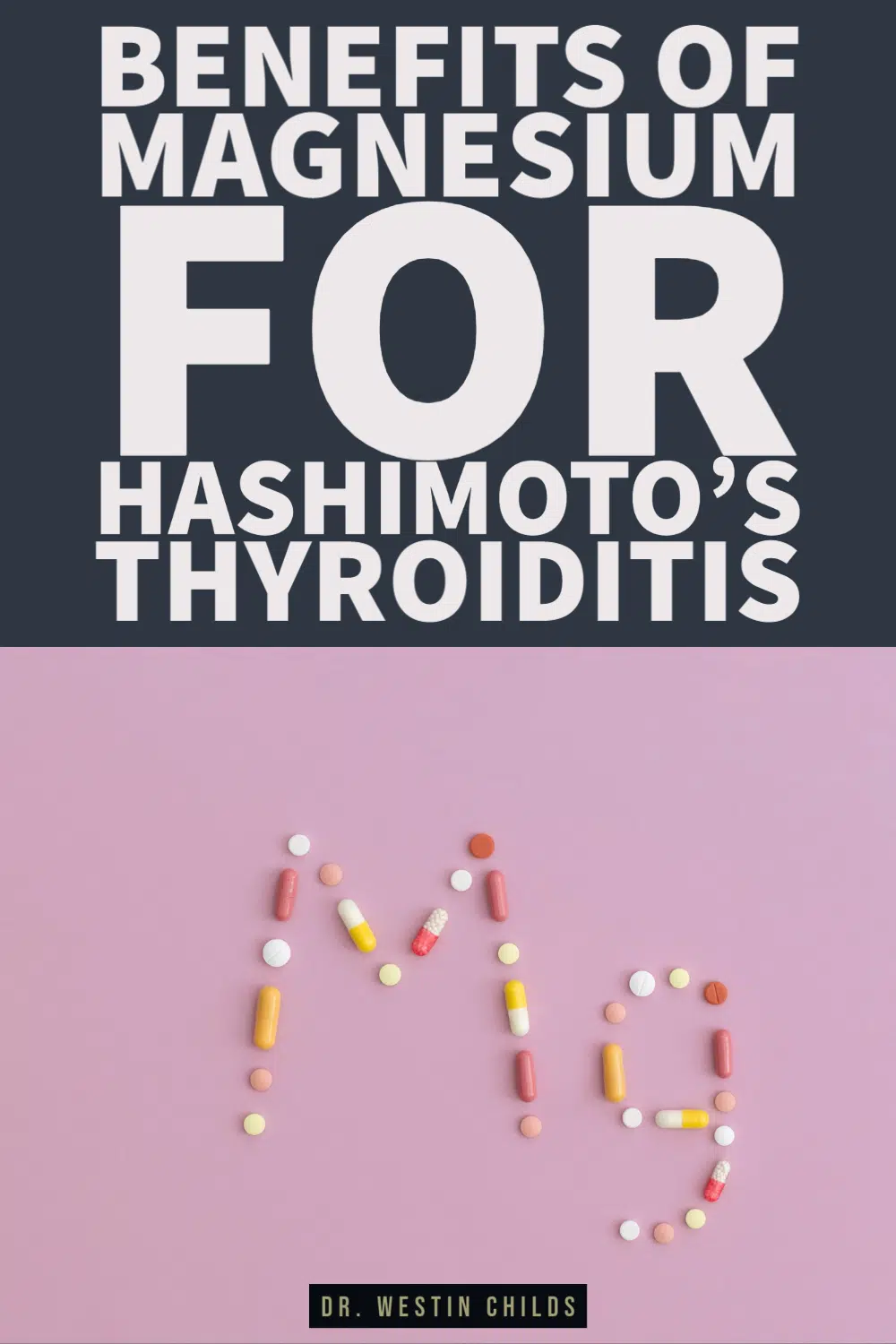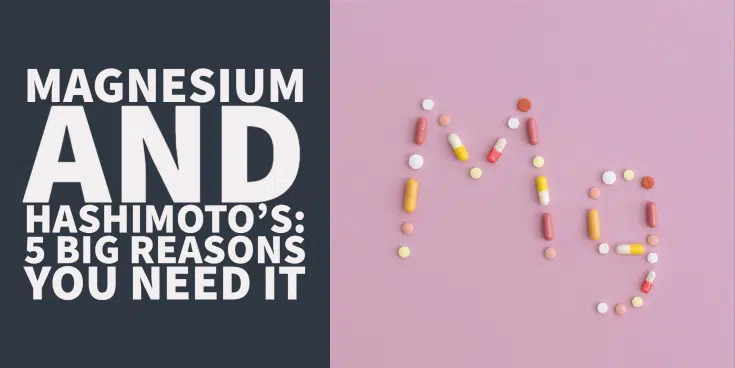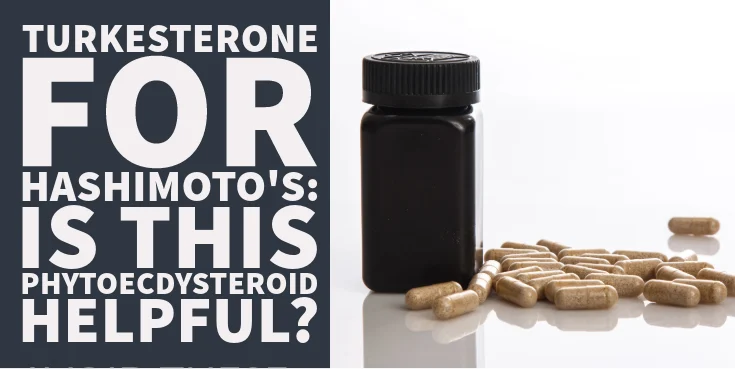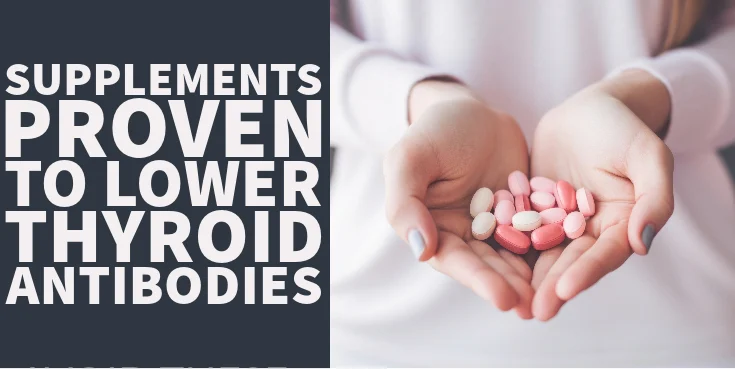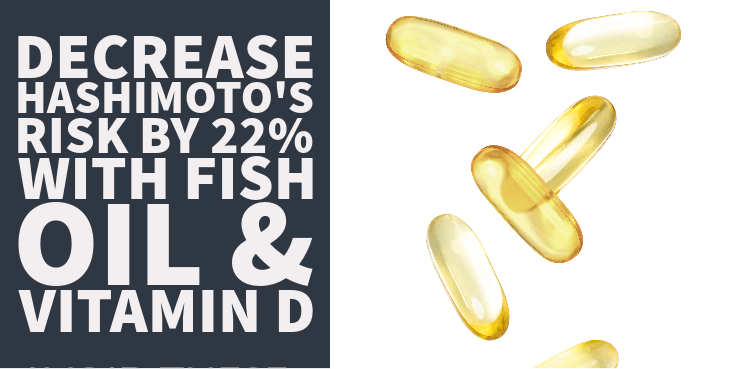Patients with Hashimoto’s are at Increased Risk of Developing Magnesium Deficiency
Magnesium is one of 3 main nutrients required to prevent thyroid gland damage inside of your body and, unfortunately, thyroid patients often don’t get enough.
If you are struggling with Hashimoto’s thyroiditis, thyroid gland damage, inflammation, or poor thyroid lab tests, then this information is for you.
Supplementing with magnesium has the potential to improve thyroid function, reduce thyroid gland damage, support gut health, and much more.
When it comes to supplements and your thyroid, most of the attention is put on other nutrients such as iodine.
And while iodine is definitely important, magnesium levels may be more important for the reasons we will discuss today.
For starters, magnesium is involved as a cofactor in no fewer than 300 different biochemical reactions (1).
This is both a good and a bad thing.
Good in the sense that we know how important magnesium is for your entire body and taking it can improve many different systems to help you feel better.
Bad in the sense that because it’s so integral to so many different functions it can be difficult to diagnose magnesium deficiency.
A deficiency of magnesium can result in so many different symptoms ranging from depression to fatigue to thyroid problems and everything in between.
To make matters worse, some of the symptoms of magnesium deficiency can even mimic those found in low thyroid states!
We know magnesium is important for pretty much everyone but it’s especially important for those with Hashimoto’s thyroiditis.
People with Hashimoto’s should be interested in their magnesium levels because they are at higher risk for developing magnesium deficiency for the following reasons:
- Soil depletion of nutrients – This isn’t unique to magnesium but it’s something you should be aware of. Due to soil depletion, foods have fewer vitamins and minerals than they did even 20-30 years ago. This contributes to multiple nutrient deficiencies among thyroid patients, even those eating healthy whole foods.
- Thyroid dysfunction alters magnesium metabolism and excretion – Both hyperthyroidism and hypothyroidism impact what happens to magnesium levels in your body. In particular, hypothyroidism (which results from Hashimoto’s) may cause increased magnesium excretion through the kidneys and the stool (2). This means even if you are taking enough magnesium your body may be eliminating it without you even knowing!
- Stress depletes magnesium – Lastly, stress is a known depleter (3) of magnesium levels. As a thyroid patient, I probably don’t have to convince you that you are under more stress than the average person due to issues in getting on the right treatment with your doctor, managing consistent hypothyroid symptoms, and dealing with issues such as brain fog or depression.
For these 3 reasons, there’s a VERY good chance that if you have Hashimoto’s you probably also have low magnesium levels.
Why is that a problem?
For 5 main reasons…
DOWNLOAD FREE RESOURCES
Foods to Avoid if you Have Thyroid Problems:
I’ve found that these 10 foods cause the most problems for thyroid patients. Learn which foods you should avoid if you have thyroid disease of any type.
The Complete List of Thyroid Lab tests:
The list includes optimal ranges, normal ranges, and the complete list of tests you need to diagnose and manage thyroid disease correctly!
5 Reasons Hashimoto’s Patients Need Optimal Magnesium
Outside of regular health, magnesium plays an important role in the regulation of thyroid function, immune function, the production of glutathione, and even adrenal health.
Low magnesium levels can impact any or all of these symptoms which can easily complicate your clinical picture.
Your clinical picture refers to what you look like as a patient when you present to your doctor.
If your clinical picture is confusing then it will make diagnosing and treating your condition more difficult!
Put in simple terms, it may mean that you bounce around from doctor to doctor or from medication to medication trying to figure out what works for you.
We will discuss replacing low magnesium levels later in this article but for now, let’s focus on why magnesium is so important for your thyroid.
#1. Magnesium is Required to Produce ATP which is Necessary for Iodine Entry into the Thyroid Gland.
ATP stands for adenosine triphosphate and you can think of it as the energy currency of your cells.
If your cell wants to do anything then it pretty much always needs ATP to do it.
Without ATP your cellular functions would come to a halt and they would die.
Magnesium plays an important role in the creation of ATP (4) so if you don’t have enough of this ATP then you can’t produce the energy that your cells needs.
It’s not that magnesium deficiency results in cell death or the complete decrease in cellular ATP production, instead it results in decreased efficiency in the creation of ATP.
Your thyroid will still have some ATP it may just not have enough ATP to run cellular functions at an optimal level.
Why does this matter to the thyroid gland?
Because your thyroid needs to use ATP to bring iodine in.
Iodine enters thyroid cells through something called the sodium/iodide symporter (5).
This symporter brings iodide (which then turns into iodine) into your thyroid cells where it can then be used to create thyroid hormone.
And guess what, this symporter leans heavily upon gradients created by ATP.
An easy way to think about this concept is by thinking about how we use energy in our daily lives.
Imagine that you are trying to move 100 gallons of water down a mountain.
You don’t have to put much energy into moving that water down the mountain because gravity will do much of the work.
Now imagine you are trying to move 100 gallons of water UP the mountain. This feat will require a LOT of energy either in the form of your own muscles or some sort of vehicle.
Either way, it takes a lot of effort to move that water uphill.
That’s sort of what happens with moving iodide into the thyroid gland. It doesn’t naturally want to go there so your thyroid creates a gradient to allow it to happen more freely but that gradient requires ATP.
If you can’t produce enough ATP to create the gradient then you can’t get iodide into the thyroid gland which means you will blunt thyroid hormone production.
Put in simple terms, if you can’t produce thyroid hormone then you will be more low thyroid than you were previously.
And if you have Hashimoto’s, that’s the last thing you want since Hashimoto’s already results in low thyroid due to immune damage of the thyroid gland.
#2. Magnesium Balances the Immune System and May Help Reduce Inflammation.
It’s quite clear that magnesium plays some role in regulating immune function but the specifics are a little fuzzy.
We know, for instance, that decreased magnesium increases inflammation in the thyroid gland in people who have Hashimoto’s (6).
It’s not the magnesium deficiency that CAUSES or TRIGGERS Hashimoto’s and thyroid gland inflammation per se but, instead, that inflammation is made worse in the setting of magnesium deficiency.
It’s unlikely that you can use magnesium as a way to reduce your thyroid antibodies but it’s still a very good idea to use magnesium if you are deficient to try and prevent further thyroid gland damage.
We also know that as magnesium levels fall inflammatory markers increase such as CRP and interleukin-6 (7).
Why is this important?
Because, as you probably already know, Hashimoto’s is primarily a disease of the immune system.
It is secondarily a disease of the thyroid gland, which is still important, but most of your attention and therapies should be directed at balancing immune dysfunction in an attempt to halt the progression of Hashimoto’s whenever possible.

If you can cool down the immune system and prevent thyroid gland damage and inflammation then you may be able to prevent complete or irreversible thyroid gland destruction.
By the way, this may also allow you to indirectly improve thyroid function by using magnesium!
If you stop the autoimmune attack of the thyroid gland and give your thyroid some breathing room then it may “turn on” and produce more thyroid hormone.
#3. Magnesium Impacts Thyroid Lab Tests Including Free T3 and Free T4.
This probably shouldn’t be surprising given what we’ve talked about thus far but you should be aware that magnesium deficiency can negatively impact your thyroid lab tests.
I say it shouldn’t be confusing to understand because your thyroid lab tests are a reflection of your thyroid gland.
If your thyroid gland can’t produce enough thyroid hormone then your thyroid lab tests will show it!
When it comes to Hashimoto’s, patients will often see a high TSH, low free T4, and low free T3.
Hashimoto’s patients with magnesium deficiency who supplement with magnesium may see an improvement in all of these lab tests including a normalization of the TSH and an elevation in free thyroid hormones.
In fact, we have studies that show that this can happen.
In these studies, researchers have identified patients who have Hashimoto’s and provided them with magnesium supplements.
They checked their thyroid lab tests both before and after supplementation with magnesium and found that thyroid lab tests showed improvement after using magnesium supplements.
And it makes perfect sense.
There’s nothing special or magic about magnesium supplementation for Hashimoto’s patients.
The reason these patients are helped and feel better when taking magnesium is most likely for the following reasons:
- Patients with Hashimoto’s are most likely depleted of magnesium due to stress and increased metabolism of magnesium.
- When those magnesium levels are repleted they help restore glutathione production in the thyroid gland, bolster immune function, and increase iodine levels in the thyroid gland.
- As the immune system regains some balance and as glutathione levels rise, the thyroid can naturally work better.
- The combination of these factors results in improved thyroid lab tests.
#4. Magnesium is Needed for Glutathione Production.
As a patient with Hashimoto’s, you should definitely become very familiar with the master anti-oxidant known as glutathione.
Glutathione is produced in the thyroid gland and its primary purpose is to neutralize free radicals and prevent oxidative stress.
This is important for all thyroid patients and especially for those with Hashimoto’s because the very act of producing thyroid hormone in the thyroid gland results in the production of a potentially harmful metabolite called hydrogen peroxide (8).
Hydrogen peroxide needs to be taken care of and neutralized by the thyroid gland before it causes internal cellular damage and one of the ways that your body does this is through the use of glutathione.
This process is so important in Hashimoto’s that it may be one of the causes or triggers of developing initial cell damage which leads to the triggering of the immune system.
Imagine if you have an excessive amount of free radicals inside of your thyroid gland damaging your cells.
Cellular components may then enter into your bloodstream where they can be picked up by your immune system which can then create antibodies to them.
This may be one of the ways that Hashimoto’s is triggered and it all starts inside of the thyroid gland.
It’s been theorized that one of the reasons that patients develop Hashimoto’s is because these patients have more free radicals than they have anti-oxidants to clean them up.
Providing your body with nutrients that help increase the production of glutathione either directly or indirectly may tip the balance in favor of anti-oxidants.
Two very important nutrients required for the production of glutathione include magnesium and selenium.
#5. Magnesium is Required for Cortisol Regulation and Metabolism.
It’s readily apparent that the thyroid system and the cortisol system are closely linked (9).
If you experience problems with one system it will almost always cause problems in the other system.
The condition impacting your adrenals in this way is usually referred to as adrenal fatigue, though there is considerable controversy surrounding that diagnosis.
We won’t harp on that topic for now but what I will say is that it’s not uncommon for patients with Hashimoto’s to also have issues with their adrenal glands and cortisol function.
The connection between adrenal health and thyroid dysfunction is so strong that I almost always recommend adrenal support supplements for patients with thyroid disease of any type.
But let’s set aside the connection between the thyroid and adrenal health for a moment and focus on magnesium.
It turns out that magnesium deficiency by itself also impacts your adrenal health and adrenal function.
Even in the absence of thyroid problems, magnesium deficiency may be sufficient to result in adrenal fatigue-like symptoms.
This is obviously compounded in those people who have Hashimoto’s because not only are they at more risk for developing magnesium deficiency, they also tend to have adrenal problems for the aforementioned reasons.
What you need to know here is that improving your magnesium is not only helpful for your thyroid gland but may also help improve your adrenals as well.
Testing for Magnesium: Do You Need to?
The next question we have to answer is what should you do next?
Do you need to test your magnesium levels? Is it safe to just start supplementing and see what happens? What should patients with Hashimoto’s do next?
The answer is pretty simple:
For most people, it’s safe to just use magnesium supplements.
I’ll talk about which magnesium supplements to use in just a minute but let me explain why I think it’s safe for most people to supplement without testing.
The first reason for this recommendation is that magnesium supplementation is incredibly safe.
The biggest reason to test before supplementation is to make sure you aren’t taking too much so you don’t accidentally cause more harm than good.
Having said that, there are certain supplements and nutrients which have a very safe and good track record.
Magnesium is one of those.
In fact, the most common side effect of taking too much is loose stools or diarrhea.
And to get to that point you have to take a fairly high amount.
Standard doses range from 150 to 300mg per day but I’ve seen people take as much as 1000mg per day without any issues or problems.
If you are worried about dosing then just listen to your gut.
Your gut will tell you if you are taking too much based on how loose your stools are.
The body is very efficient when it comes to eliminating out excess magnesium either through the kidneys or through the stool.
The second reason is that magnesium testing is not very accurate.
When it comes to magnesium, about 99% of it is found inside of your cells (10).
Unfortunately, we don’t have a very good way to test intracellular magnesium levels because we can’t stick a needle in there to test it.
What we do instead is check your magnesium levels in the blood (where only about 1% of magnesium resides) and then make assumptions of what’s happening inside of your cells based on that data.
This can work okay in some circumstances but usually isn’t very accurate as there can be a mismatch between extracellular magnesium and intracellular magnesium.
Because of this, serum magnesium (11) is usually better for diagnosing big deficiencies in cellular magnesium levels but doesn’t give you much data if it comes back as normal.
Some people will recommend getting RBC magnesium (12) which is a slightly more accurate version of magnesium but it still suffers some of the same problems.
The third reason is that it’s fairly safe to assume you are deficient even without testing.
Finally, as a patient with Hashimoto’s (or any thyroid disease), it’s fairly safe to assume that your magnesium level is not where you want it to be, especially if you aren’t already taking supplements.
Because of how the thyroid impacts magnesium levels, because of depleted soil levels, and because of the stress that we are all under, it’s a fairly safe assumption.
When you combine this idea with the fact that it’s a relatively cheap ingredient and carries with it few side effects, the potential benefits of supplementing far outweigh the negative consequences.
Supplementing with Magnesium (The Easy Way)
There’s a lot to say about the best type of magnesium to take if you have Hashimoto’s so I will keep it simple for this article.
Magnesium supplements can come bound to different forms which impact how they will be used by the body.
Some forms, such as magnesium citrate, are better for treating things like constipation (13) whereas other forms, such as magnesium threonate, may be better for managing brain-related symptoms (14) such as depression.
When it comes to Hashimoto’s, you generally want to get a highly bioavailable form of magnesium that will get into your system and into your body.
This will ensure that it eventually gets to your thyroid gland and stays there where it can help.
The best form for this is a magnesium glycinate complex or magnesium bound to malate.
You can use other forms of magnesium but I find that this form works best for those with Hashimoto’s.
Your Next Steps
Magnesium is incredibly important for overall health both in those with thyroid problems and even in the general population.
I don’t have any thyroid problems but I do supplement with magnesium from time to time as I find that it’s a nutrient that I constantly need to replete.
Compared to the general population, patients with Hashimoto’s are more at risk for developing magnesium deficiency and can, therefore, benefit from magnesium supplements.
Supplementing with magnesium may help naturally improve thyroid function by its influence on glutathione production, iodine entry into the thyroid gland, balancing cortisol, and reducing inflammation.
Because magnesium supplements are so safe and often needed by patients with Hashimoto’s, it’s usually fine to take a magnesium supplement without testing your magnesium levels.
Now I want to hear from you:
Have you taken magnesium to help support your thyroid?
If so, what type of magnesium did you use?
Did you realize just how important magnesium is for your overall health?
Are you planning on taking a magnesium supplement?
Leave your questions or comments below!
